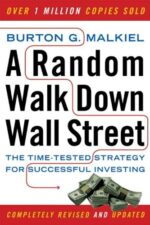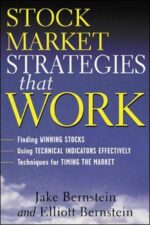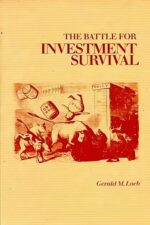100 Minds That Made the Market
$15.81
In 100 Minds That Made the Market, Ken Fisher delivers cameo biographies of these pioneers of American financial history. From Joe Kennedy’s “sexcapades” to Jesse Livermore’s suicide, this book details the drama, the dirt, and the financial principles of an amazingly inventive group of financial minds. Fisher digs deep to uncover the careers, personal lives, and contributions of these individuals, and leads you through the lessons that can be learned from each one. Here you have 100 of the best teachers — some you already know, some you will feel you know, and some you may not have previously discovered — whose experiences will undoubtedly enhance your understanding of the markets.
Author’s Note:
100 Minds is presented in a form that chronicles Wall Street’s evolution. Eleven categories (chapters) describe people who laid the basis for the institution; those who chronicled its growth and the deal-makers who financed it; those who innovated it; and those who assimilated it into the American economy. Then came those who reformed it, systematized it, scandalized it, and those who made and lost money in it; plus a few miscellaneous others. Within each category, the stories are presented in chronological order so you can follow the flow of time.
It’s important to remember that the categories aren’t as important as the people themselves. In writing the book, the people were chosen first and categorized later. The descriptions of each of them needed to stand on their own as cameo biographies before being fitted into any particular framework. Only after the 100 were written were they placed into groups that logically flowed from the stories themselves; then chapter summaries were written to bring the 100 together with overarching themes and lessons.
As important, I wanted you to be able to choose between reading the book cover-to-cover and just picking it up from time to time for a quickie on a single person whenever someone becomes of interest to you. As a writer of two previous books, a columnist in Forbes for eight years, and an author of a lot of other material, I hope 100 Minds is entertaining and educating enough to be worthwhile to many of you in a cover-to-cover format. But I am also mindful of how many more things I would like to do than I ever have time for and presume the same is true for you. By putting it in a format where you need not read it cover-to-cover, I am freeing you to use whatever bits of the book benefit you most. If one day someone mentions Lucky Baldwin and you haven’t the foggiest as to who he was, you can save yourself the embarrassment of asking or doing a lot of library legwork by simply flipping to the index and reading a four-minute cameo story. If you want to read further about Baldwin, just flip to the appendix where there’s a bibliography for each story that shows you where to go next. And if you want to find more subjects like Baldwin, just browse around his chapter.
Many of these fascinating folks can actually be placed into several different categories. How can you put J.P. Morgan into one box? And Ben Graham was an author, but he was much more, as were so many of these great pioneers. Yet I had to categorize them somewhere and did so where they made most sense to me. If you see it differently, I beg for your patience. Also note that many of these lives are interrelated, so when one subject is mentioned in another’s story, he or she is cross-referenced by boldfacing their name upon first reference, so you can quickly flip to that story for more.
100 Minds That Made the Market By Kenneth Fisher pdf
| Author(s) | |
|---|---|
| Format | |
| Pages | 451 |
| Publication Year | 2007 |
8 reviews for 100 Minds That Made the Market
Only logged in customers who have purchased this product may leave a review.










Alvin Cabrera (verified owner) –
The author states that this book is written mainly for fun, it certainly is that but it also reinforces some profound lessons for anyone who is interested in the workings of the stock market. Although a book consisting of 100 thumbnail sketches of notable Wall Street characters may not seem like a recipe for an interesting book, Mr Fisher has a warm and accessible writing style. The choice of the 100 minds that make up the book is obviously the author’s own and generally are very well chosen, however the omission of Rockerfellar seems to me to be the one oversight in the book, as he casts a shadow over many of the other 100 minds.
Generally, this is a great book for anyone who wishes to be entertained and learn something of Wall Street’s history at the same time.
Daleyza Davenport (verified owner) –
I didnt expect to learn much from a book that summarizes a great mind in only three to four pages. However, I also didnt expect the author, or editors employed by the successful fund manager/author/columnist to adopt that tabloid style to drill into the personal life rather than the investing/trading/business success of each. For e.g. on Benjamin Graham, “Meanwhile, Graham was also busy bustling between his homes in La Jolla, California and Provence, France, where he ultimately died in the company of his long time French mistress, whom he’d courted away from his son!” I had not read through the whole book, but similar “insulting style” was applied on Bernard Baruch, Jesse Livermore and William Gann, of which I had studied before. If you read to sharpen your edge, I strongly recommend you to put your valuable time and money somewhere else.
Hector Parks (verified owner) –
Very interesting but marred by the author’s frequent personal remarks against the regulators and regulation of Wall Street in any way. Thanks but no thanks, I bought this book for the short biographies. I took one star off for that.
Another continuous flaw to an otherwise excellent book is the constant typos, at least in the pdf version.
This book is not about trading, it is about the history and people that made up the market that we have today. If you are looking for a good trading book, there are many to be found elsewhere.
Ainsley Dillon (verified owner) –
This is a great book for reading the short bios of the financial history makers. I just picked and chose the people I was interested in reading about.
Violet Vaughn (verified owner) –
Some people are hard to buy gifts for. With books, there is often a trade-off between books that say a lot, and those that people are willing to read. One book that I think hits the sweet spot is 100 Minds That Made The Market, by Ken Fisher.
Why do I think this? This book is 100 little books in one volume. You can pick this book up for five minutes, and read a well-written 3-4 page biography of person who has had a significant impact on how our markets work today. Then you can put it down, get back to work, and think that you have learned something significant.
When I read this book back in the late ’90s, I recognized about half of the people who were profiled in the book. I felt that I learned a lot in a short amount of time.
Consider the categories of people that the book deals with:
* The greats of the distant past (late 18th Century to mid 19th Century)
* Investment Writers and Data Publishers
* Famous investment bankers
* Bankers
* Central Bankers
* New Deal Regulators
* Swindlers, Scamps, Rogues, and Thieves
* Statisticians, Economists, and Nuts
* Successful Entrepreneurs and Speculators
* Unsuccessful Entrepreneurs and Speculators
* Notable Oddballs
* And more
The biographies are well-written and concise. They illustrate eras in Western, and in particular, American Capitalism. Many of the names are obscure in the present day, but after you read the biography, you have no doubt that they were important to their era.
I enjoyed the book greatly, and hope that you will too.
Brady Torres (verified owner) –
well done
Dariel Decker (verified owner) –
Ken Fisher compiled a great brief history of those 100 individuals that have had the greatest impact on the stock market since it’s beginning on Bowling Green.
Biographic references to Edson Gould and his market forecasting accuracy was most appreciated. Jay Gould coverage was also excellent.
Remy Jefferson (verified owner) –
Bought this book a couple years ago to read on a long airline flight and would recommend the book to others who also enjoy reading about the history of those individuals who shaped the financial world.
Was a fun book to read since it gives on average a 2 – 3 page synopsis of many of the individuals who shaped the financial world as well as their sometimes “humorous financial follies”.
It is an easy read, but at the same time an extremely fun book to read for those who enjoy finance and the history of finance.
*** Note: This is not a book specifically about trading or investing, but rather a book about the history of those people who shaped the financial world. If your academic and/or professional background is in finance or you are a student of financial history then you will most likely enjoy this book for hobby reading, but if you are looking for a book to teach you about trading or investing then chances are this book is not for you since it is about “the history of those individuals who shaped the financial world as well as their mistakes and contributions”.